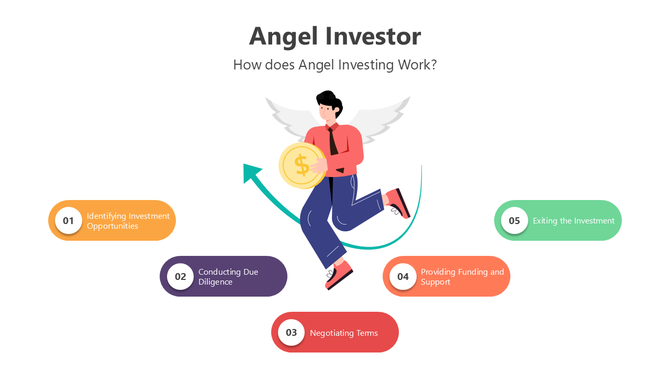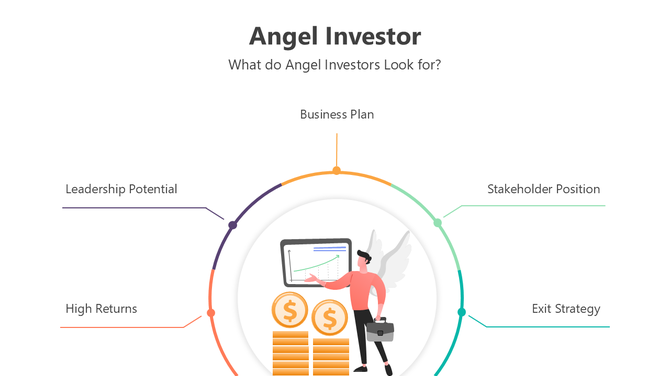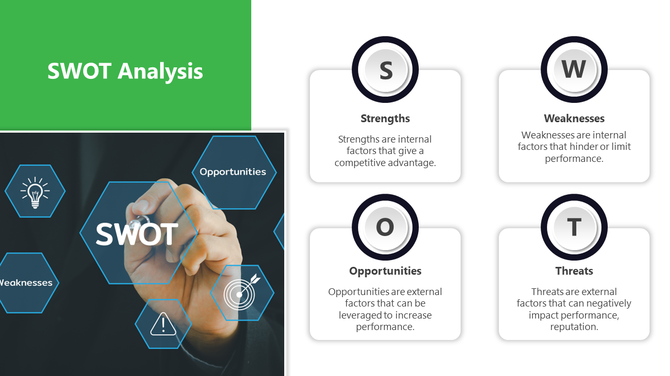Introduction
If you’re building a startup and thinking about raising funds, angel investors are often the first people who can believe in your dream and help make it real. They usually invest their own money and take a chance on startups in their early stages — when there’s more risk, but also more room to grow. But before you pitch to them, it’s important to understand what they expect and how you should prepare.
In this blog, you’ll learn the five most important things you should know before pitching to angel investors. These are the key steps to help you make a confident pitch and earn their trust.
✅ 1. Know Who Angel Investors Are and How They Think

🔹 Who are angel investors?
Angel investors are individuals who use their personal money to invest in startups, often at the idea or prototype stage. They are not big institutions or banks — they’re people who take personal risks to support new businesses. Many of them are former entrepreneurs or professionals who want to support the next generation of founders.
🔹 How are they different from venture capitalists?
Unlike venture capitalists (VCs), who invest other people’s money from large funds, angel investors use their own money. VCs usually come in later when a startup has shown some success. Angel investors step in earlier, when your idea is still young and needs help to grow.
🔹 Why are they called “angels”?
They’re called angels because they often support startups during tough times — when you have no revenue, no users, and only a vision. Their money and guidance can keep a startup alive during its early and risky phase. Without them, many startups wouldn’t survive long enough to raise more funding.
🔹 What motivates angel investors?
Some angel investors invest because they want high returns. Others do it to support innovative ideas or help new founders. Many enjoy mentoring startups and sharing what they’ve learned over the years. Their reasons can be personal, financial, or both.
🔹 What do they look for at this stage?
They don’t expect a perfect product. What they want is potential — a good idea, a committed founder, a clear problem, and a path to grow. If you can show these things clearly, you have a good chance of getting their attention.
✅ 2. Understand What Angel Investors Look For Before Investing

🔹 A passionate and capable founder
Angel investors want to see that the founder is serious, passionate, and ready to face challenges. They need to believe you’re someone who will keep going, even when things get tough. Your energy, honesty, and leadership style matter just as much as your idea.
🔹 A team that works well together
You don’t need a big team, but investors want to see that your team is complete for your stage. For example, someone to build the product, someone to sell it, and someone to manage. If you’re missing key roles, be honest and show how you plan to fill them.
🔹 A real and urgent problem
Your business should solve a real-world problem — not just something “cool” or interesting. Investors want to fund startups that fix things people truly care about. Make it clear who your target users are and why your solution matters to them.
🔹 A unique and clear solution
There might be other startups solving the same problem. That’s okay — but what makes yours better or different? Is it faster? Cheaper? More accessible? Angel investors want to know why your approach will win in the long run.
🔹 A big market and growth potential
A great product in a tiny market won’t excite investors. They want to see that your idea can reach many people or businesses. Explain how big your market is and how your business can grow over time — even if you’re starting small.
🔹 Early traction or signs of interest
You don’t need millions of users, but small wins like beta testers, pre-orders, newsletter signups, or pilot customers help a lot. These signs show that your idea already has interest, which lowers the risk for the investor.
🔹 A way for them to earn money later
Angel investors want a return on their investment. You need to explain how they’ll get their money back, plus profit. That might be through a company sale, IPO, or future funding round where they sell their shares. This is called an “exit strategy.”
✅ 3. Prepare a Solid Pitch Deck and Key Materials

🔹 Keep your pitch deck simple and clear
Your pitch deck is the main tool for your meeting. It should be short, clear, and easy to understand. Use simple words, clean visuals, and avoid long paragraphs. Think of it as telling a short story — not writing a business book. To craft a strong pitch deck, get to know the top 5 Easy Ways to Make Your Pitch Deck More Engaging.
🔹 Must-have slides in your pitch deck
Every good pitch deck includes certain slides: the problem, your solution, your product, your market size, your business model, your go-to-market plan, your team, financials, traction, the ask, and exit strategy. Missing any of these will leave investors with questions.
🔹 Share realistic financials
You don’t need exact numbers for everything. But you should show your expected revenue, costs, and profit over the next 3–5 years. Use simple tables and keep it honest. If your estimates seem too good to be true, investors may lose trust.
🔹 Define your “ask”
Tell the investor exactly how much money you’re raising and how you will use it. Break it down — for example: 50% on product, 30% on marketing, 20% on hiring. Also explain how long this funding will last and what milestones you’ll reach with it.
🔹 Practice your delivery
The way you say things is just as important as what you say. Practice with friends, mentors, or record yourself. Speak clearly, stay confident, and keep your tone friendly and honest. You want to sound like someone the investor wants to work with.
✅ 4. Be Honest, Not Perfect

🔹 Investors respect honesty
If you don’t know something, say so. It’s better to admit gaps than pretend you have all the answers. Investors value founders who are open, thoughtful, and realistic about their challenges.
🔹 Talk about risks and assumptions
Every startup has risks — like competition, delays, or product-market fit. Instead of hiding them, show that you’ve thought about these issues and have backup plans. This makes you look more prepared and trustworthy.
🔹 Be open about gaps
You may not have a full team, product, or customer base yet. That’s okay. Just show what you have now, and clearly explain what’s next. Investors know startups evolve — they just want to see a founder who is honest and has a plan.
🔹 Don’t exaggerate number
Saying things like “we’ll capture 10% of the market” without real proof can hurt your credibility. Use real data, market research, or examples to back up your claims. Modest, data-backed goals build more trust than wild guesses.
✅ 5. Know What Happens After the Pitch

🔹 Investors will ask follow-up questions
After your pitch, investors will ask deeper questions to test how well you know your business. Be ready to explain your customer plan, competition, business risks, or how you’ll spend their money. The better you answer, the more confident they’ll feel.
🔹 It’s okay if they say no
Sometimes investors will pass — and that’s normal. It may not be the right time, or the right fit. Don’t take it personally. Ask for feedback and keep improving your pitch for the next one.
🔹 If they say yes, it’s more than money
Angel investors often become your early supporters. They can offer advice, contacts, and even open doors to future funding. Keep them updated, ask for input, and treat them like true partners in your business journey.
🔹 Keep them updated
After the investment, send regular updates. Share progress, wins, challenges, and milestones. Even a short monthly or quarterly email helps keep your investors engaged and willing to help more.
Pro tip: If you don’t have time to design, work with a investor pitch deck design service to make it professional and easy to follow.
🔚 Final Thoughts: Pitching Is About Trust, Clarity, and Growth
Angel investors are not just money-givers. They are people who believe in early-stage founders and ideas. If you want their support, you need to show three key things: clarity, honesty, and potential.
Prepare your story well. Show that your idea is solving a real problem. Be honest about where you are and what you need. And most of all, help them believe that their money — and their trust — is in the right hands.
🙋♂️ FAQs:
1. How much equity do angel investors usually ask for?
✔ Typically between 10% and 25%, depending on your startup’s value and stage.
2. Do I need a product before pitching?
✔ Not always. A strong idea or prototype (MVP) with a clear plan is sometimes enough.
3. How long does it take to get angel investment?
✔ It can take weeks to months. It depends on your preparation, investor availability, and follow-up.
4. What return do angel investors expect?
✔ Many look for 5x to 10x return on their investment over 5–7 years.
5. Where can I find angel investors?
✔ AngelList, LinkedIn, local pitch events, startup meetups, accelerators, and founder introductions.









